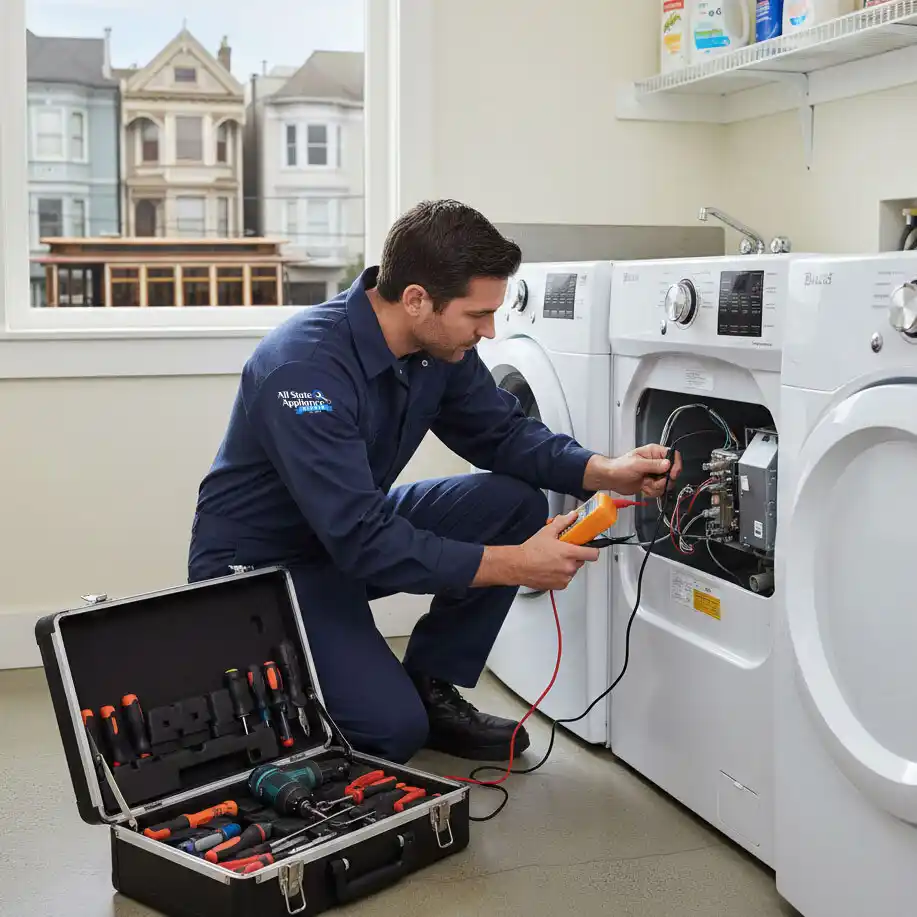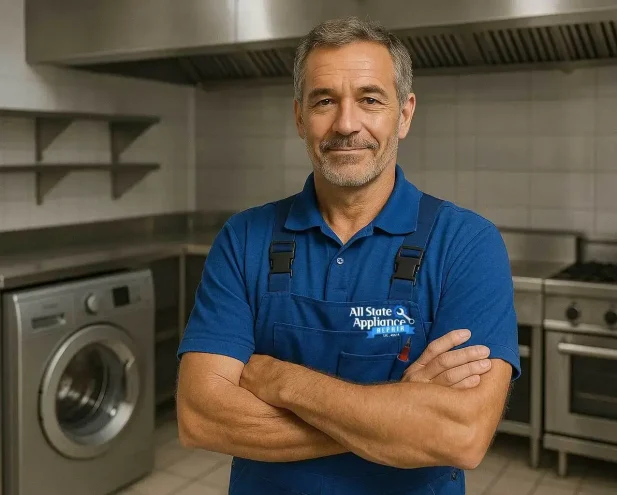5758 Geary Blvd #128, San Francisco, CA 94121, United States
All State Appliance Repair offers expert dryer repair in San Francisco, delivering fast, reliable fixes for gas, electric, and ventless models to get your laundry routine back on track without delay.

Expert fixes for ignition failures, gas valves, and SF seismic-related vent damage.
Heating element, thermostat, and electrical issues resolved quickly and safely.
Ideal for SF apartments. We fix moisture sensors and clogs in condenser units.
In San Francisco’s foggy, humid climate, clothes dryers face accelerated lint buildup and vent clogs, causing failures in gas, electric, and ventless models. All State Appliance Repair’s licensed technicians diagnose and fix these issues
Dryer not heating often arises from faulty heating elements, thermal fuses, or thermostats in electric or gas dryers, worsened by San Francisco’s humid lint buildup restricting airflow and causing overloads. Signs include damp clothes or no hot air, raising fire risks. We replace elements or thermostats and clean vents for efficient, safe drying.
A dryer that won’t start or spin typically involves broken drum belts, door switches, or motor failures, intensified by overloading or seismic damage in San Francisco stackable dryers common to Pacific Heights apartments. Symptoms: no tumbling or error codes. Our fixes include belt replacement or motor repair with OEM parts, restoring smooth operation.
Loud dryer noises stem from worn drum rollers, idler pulleys, or blower wheels, accelerated by urban vibrations in San Francisco commercial or washer-dryer combos. Indicators: squeaking or rattling during tumbling. We replace rollers or pulleys, inspect for balance, and reduce wear for quieter performance.
Overheating results from clogged vents or faulty thermostats in heat pumps or ventless dryers, with San Francisco humidity increasing fire hazards via lint accumulation. Signs: burning smells or shutdowns. Our solution: vent cleaning and thermostat replacement, ensuring safety and compliance with Bay Area energy standards.
Slow drying is caused by lint blockages or vent hose damage in clothes dryers, common in seismic San Francisco where shifts kink ducts and fog slows evaporation. Symptoms: damp clothes post-cycle. We clean traps and replace hoses, optimizing airflow for faster cycles.
Shutting off mid-cycle links to overload sensors or control board failures in tumble dryers, affected by San Francisco’s humidity on electronics in washer-dryer combos. Indicators: interrupted cycles. We repair boards or check sensors with diagnostics, minimizing downtime for Bay Area families.
Burning smells originate from lint buildup or electrical faults in gas dryers, heightened by San Francisco fog causing corrosion on igniters or wiring. Odor signals hazards. Our deep cleans and wiring inspections clear debris, ensuring odor-free, safe drying.
Error codes indicate sensor malfunctions or control issues in ventless or stackable laundry dryers, worsened by San Francisco humidity on boards. Alerts halt cycles. We reset diagnostics and replace parts, preventing disruptions.
Excessive vibration stems from unlevel installation, worn shock absorbers, or loose drum components in dryers, worsened by San Francisco’s seismic activity and uneven floors in Financial District apartments. Signs: shaking or thumping during operation, risking damage. We level units, replace absorbers, and tighten parts for stable, quiet performance.
With countless dryer repair options in SF, we stand out for our reliability and expertise:
Our technicians are licensed and insured , delivering expert appliance repairs with the highest standards of safety and professionalism.
We offer urgent dryer repair in San Francisco to get you cooking again fast.
Our team consists of highly experienced and certified technicians who are trained to fix all dryer brands and models with precision.
No guesswork—we pinpoint the issue at no cost before starting repairs.
Every repair is backed by a 1-year warranty on parts and labor for peace of mind.
Proudly serving San Francisco, Marin County, and the Bay Area with local know-how.
Our customers love our fast, reliable dryer repair services:
All State Appliance Repair provides fast, reliable dryer repair services throughout San Francisco’s most popular neighborhoods and surrounding Bay Area communities. Our certified technicians serve all major districts with same-day service availability.
SF Neighborhoods
Response Time
Emergency Service
Call or book online for same-day or next-day appointment at your convenience.
Our technician inspects your dryer and identifies all issues, including heating element problems.
We provide honest, upfront pricing before starting any work—no surprises.
Using genuine parts, we fix your dryer quickly and efficiently with expert care.
Your repair is backed by a full-year warranty on parts and labor for peace of mind.


Don't let a broken dryer disrupt your routine—call our skilled San Francisco experts for immediate same-day repairs and get it tumbling again fast!
Deciding whether to repair a dryer depends on factors like its age, the specific issue (e.g., faulty heating element or thermal fuse in gas or electric dryers), repair costs, and the price of a new unit. For a clothes dryer with an average life expectancy of 10-13 years, use the 50% rule: If the repair costs less than 50% of a new dryer's price (typically $500-800 for basic models) and the appliance is under 7 years old, repairing is often worthwhile. This avoids unnecessary waste and extends usability, especially for common failures like a blown thermal fuse or worn drum belt. However, in humid climates like San Francisco, where lint buildup accelerates wear on parts like vents and heating elements, frequent issues may signal replacement for better energy efficiency and safety. For instance, if fixing a ventless condenser dryer exceeds $400, consider upgrading to an energy-efficient model to reduce long-term costs from overheating or fire hazards. Always consult a licensed technician for a diagnostic assessment, as entities like warranty coverage or brand-specific parts (e.g., Whirlpool heating coil) can tip the scale toward repair.
Dryer repair costs typically range from $100 to $400 on average, influenced by the problem, dryer type (gas vs. electric), parts needed, and labor rates. Simple fixes, like replacing a thermal fuse or door switch in a laundry dryer, might cost $50-150, while more complex issues—such as a faulty control board or drum bearing in stackable or commercial dryers—can reach $300-800, including $50-100 per hour for technician time. In San Francisco's Bay Area, where humid weather exacerbates vent clogs and heating element failures, expect higher costs due to specialized labor for entities like gas valve solenoids or moisture sensors. Factors like brand (e.g., LG or Samsung parts are pricier) and emergency same-day service add 20-50%. Minimum service fees are $70-130, often waived if repairs proceed. To optimize, bundle with maintenance like dryer vent cleaning ($100-200) to prevent future breakdowns and ensure efficient tumble drying.
The most common dryer failure is a blown thermal fuse, often causing the appliance to run without heating, especially in gas dryers where lint buildup from the exhaust vent leads to overheating. This safety device interrupts power to prevent fires, tying into entities like clogged lint screens or flexible vent hoses that restrict airflow. In electric dryers, heating element failure (25% of issues) is prevalent, resulting in damp clothes or no heat, exacerbated by humid environments like San Francisco's foggy climate accelerating corrosion on thermostats and thermal cut-offs. Other frequent culprits include faulty igniters in gas models or worn drive belts preventing tumbling. Regular maintenance, such as cleaning the blower wheel and checking the high-limit thermostat, can mitigate these, but ignoring symptoms like error codes or burning smells often leads to cascading failures in laundry appliances.
The life expectancy of a clothes dryer is typically 10-13 years for both gas and electric models, though well-maintained units can last up to 15-25 years with proper care. Factors like usage frequency (e.g., heavy loads in commercial dryers shorten lifespan), maintenance on entities such as drum rollers, heating elements, and vents, and environmental conditions influence durability. In San Francisco's humid Bay Area, moisture increases lint buildup risks, potentially reducing longevity by accelerating wear on moisture sensors and thermostats in ventless condenser dryers. Brands like Speed Queen boast longer spans due to robust construction, while overloading or neglecting quarterly vent cleaning can halve the timeline. Energy-efficient heat pump dryers may outlast traditional tumble dryers, but seismic activity in urban areas like the Financial District could damage vents, prompting earlier replacement.
The most expensive part of a dryer to replace is often the control board (main electronic circuit board), costing $200-500 including labor, as it manages cycles, sensors, and error codes in modern laundry appliances. In gas dryers, the motor or compressor follows closely at $150-400, essential for tumbling the drum and powering the blower wheel. Electric models see high costs for the heating element assembly ($150-350), prone to failure from thermal overloads. In San Francisco apartments with stackable or washer-dryer combos, replacing the drum itself ($200-500) due to bearing wear or rust from humidity is costly, tying into entities like idler pulleys and drive belts that exacerbate issues if neglected. Premium brands like Bosch or Miele have pricier OEM parts, making repairs less economical compared to basic Whirlpool models.
Fixing a 7-year-old dryer is often worth it if repair costs are under $200-300 and the issue is minor, like a faulty thermostat or belt in gas or electric clothes dryers, as it extends usability beyond the halfway point of its 10-13 year lifespan. At this age, entities such as worn drum rollers or thermal fuses are common, and repairs can restore efficiency without the $500-800 expense of a new unit. However, in humid San Francisco climates, where vent clogs lead to frequent overheating and fire risks, replacement may be better for energy savings and safety, especially if the dryer lacks modern features like moisture sensors. Apply the 50% rule: If costs exceed half a new dryer's price, opt for upgrade to avoid recurring problems with aging parts like igniters or control boards.
If your dryer is not working—whether it's a gas dryer failing to heat due to a faulty igniter or an electric model with a broken heating element—call a licensed appliance repair technician or service like All State Appliance Repair in San Francisco for expert diagnosis and fixes. These professionals handle entities like thermal fuses, drum belts, and vent clogs, offering same-day service for emergencies. Avoid plumbers unless it's a gas line issue; instead, contact certified repairmen experienced with brands like Whirlpool or LG. In the Bay Area, local factors like humidity-induced lint buildup make specialized services essential to prevent fire hazards and ensure efficient tumble drying.
To clean a dryer vent and prevent failures like overheating or thermal fuse blowouts in clothes dryers, start by unplugging the unit and disconnecting the vent hose from the back. Use a vacuum with a narrow attachment to remove lint from the duct opening, then insert a vent cleaning brush or kit (with flexible rods) to scrub and dislodge buildup along the entire length, ideally 10-20 feet for exterior vents. For San Francisco homes with humid climates accelerating lint accumulation, clean quarterly to avoid fire risks; detach the exterior vent cover and clear debris. Reattach securely, test the dryer for proper airflow, and consider professional cleaning ($100-200) for hard-to-reach or clogged vents in apartments or stackable units.
Replacing drum rollers on a dryer costs $100-300 on average, including $10-50 for parts (typically two rear support rollers) and $50-100 per hour for labor. In gas or electric tumble dryers, worn rollers cause loud noises or uneven spinning, with higher-end brands like Bosch adding to expenses due to OEM components. In San Francisco's urban settings, where seismic activity or humidity wears axles faster, factor in diagnostic fees ($70-130). DIY kits save on labor but require disassembling the drum; professionals ensure alignment with entities like idler pulleys and belts for smooth operation.
The most common problem with a dryer is failure to heat, often due to a clogged vent, blown thermal fuse, or faulty heating element in electric models (25% of issues), leading to damp clothes or extended cycles. In gas dryers, igniter or gas valve solenoid issues prevail, tied to lint buildup restricting airflow. San Francisco's foggy weather exacerbates this by promoting moisture-related corrosion on thermostats and sensors in ventless or washer-dryer combos. Other frequent entities include worn drive belts causing no tumbling or loud noises from drum rollers, solvable with regular maintenance to extend the 10-13 year lifespan.
Before calling a dryer technician for issues like no heat in a gas dryer or no tumbling in an electric model, unplug the unit and check power sources: Ensure the circuit breaker isn't tripped and test the outlet with another appliance. Inspect the lint screen and vent hose for clogs, vacuuming buildup to restore airflow and prevent thermal fuse failures. For entities like the door switch or start button, listen for clicks when pressed; if absent, it may need replacement. Manually spin the drum to detect resistance from worn rollers or belts. In humid San Francisco areas, examine for moisture sensor faults by running a test cycle with damp clothes. If problems persist, note error codes for the tech.
A dryer making loud noises is often caused by worn drum rollers or axles, leading to rumbling or thumping as the drum spins unevenly in clothes dryers. Other entities include a damaged drive belt causing squealing, loose idler pulleys producing screeching, or a faulty blower wheel resulting in rattling from lint blockages. In San Francisco's dense urban homes, overloading stackable or commercial dryers exacerbates wear on bearings and glides, while foreign objects like coins in vents create knocking. Humid conditions accelerate corrosion, tying into safety concerns like overheating thermostats.
A dryer repair appointment usually takes 1-2 hours, depending on the issue—simple fixes like thermal fuse replacement in gas dryers may take 30-60 minutes, while complex tasks such as drum roller or heating element swaps in electric models require disassembly and up to 90 minutes. Diagnostics add 15-30 minutes; in San Francisco, factors like accessing vents in apartments or testing moisture sensors in ventless units may extend time. Emergency same-day service for entities like igniter failures ensures quick resolution to prevent fire hazards from lint buildup.
To maintain a clothes dryer and prevent breakdowns, clean the lint screen before every load to avoid thermal fuse blowouts and overheating in gas or electric laundry dryers. Vacuum the vent hose and exterior duct quarterly, especially in humid San Francisco climates where moisture promotes lint clogs and fire risks. Check entities like the drive belt and drum rollers annually for wear, lubricating if needed, and ensure level installation to reduce strain on bearings. Avoid overloading to preserve the motor and idler pulley; use low-heat settings for energy efficiency. Schedule professional vent cleaning ($100-200) yearly and monitor for signs like damp clothes or error codes to extend the 10-13 year lifespan.